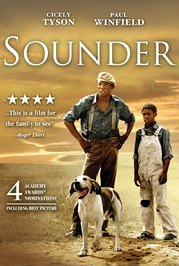Sounder (Martin Ritt, 1972): USA
Viewed by Larry Gleeson at the TCL Chinese Theatre during the 2018 TCM Classic Film Festival.
 Sounder was produced in 1972 and was adapted from a 1969 Newberry Award-winning juvenile novel by William H. Armstrong. The story follows a young boy and a family of black sharecroppers during the Great Depression era. The father, Nathan Lee, played by Paul Winfield, steals food to provide for his small family. When He is caught he is charged with illegal trespassing and robbery and sentenced to one year of hard labor in a Louisiana Parish prison camp. John A.Alonzo provided the film’s cinematography and contributed significantly to the film’s exquisite mise-en-scene while Taj Mahal created an authentic, highly original musical score.
Sounder was produced in 1972 and was adapted from a 1969 Newberry Award-winning juvenile novel by William H. Armstrong. The story follows a young boy and a family of black sharecroppers during the Great Depression era. The father, Nathan Lee, played by Paul Winfield, steals food to provide for his small family. When He is caught he is charged with illegal trespassing and robbery and sentenced to one year of hard labor in a Louisiana Parish prison camp. John A.Alonzo provided the film’s cinematography and contributed significantly to the film’s exquisite mise-en-scene while Taj Mahal created an authentic, highly original musical score.
Director Ritt marketed the film to ministers and educators allowing the film to make a nice profit. Lead actors Cicely Tyson, as Rebecca Lee, and Paul Winfield were both nominated for Oscars. The 2017 film, Mudbound, also nominated for four Oscars, shows a powerful, tour-de-force performance from American singer-songwriter, Mary J. Blige. I felt Blige’s performance shared a remarkable resemblance to Tyson’s performance.
The narrative strikes at the heart emotionally. After, the father is sent to prison, the family manages to get the seed in the ground and to harvest the grown crop. Along, the way, the eldest child, David, played by Kevin Hooks in his first big-screen role, goes to find his father at the prison camp. When the family goes to get the location at the courthouse, a confederate monument is clearly visible in the frame as the family is about nto go into the sheriff’s office. The sheriff tells the family he can’t tell them where Nathan is. Eventually through a family friend, Mrs. Boatright, played by Carmen Matthews, David ascertains the location after Mrs. Boatright finds the location by peeking into the sheriffs files when he is momentarily called away. The sheriff threatens her with social ostracization if she tells where Nathan is.
David goes on a seven-day walkabout sleeping under the stars with the family’s hunting dog, Sounder. David comes across an all-black school where blacks in history are studied and celebrated by a black teacher. David is invited to attend the school bu tmust leave home to do so and he is reluctant when his father returns home. In one of the film’s most intimate moments. David runs away after his father tells him he must go. Nathan chases after David and in an exquisite moment by a wooded stream, Nathan tells David, sometimes you lose when you go after something. But you always lose the ones you don’t go after. The driving undercurrent is Nathan wants David to break the chain of being a sharecropper. The 2016 Oscar-nominated Fences (2016), based on August Wilson’s 1985 play, tells a similar story with a much harsher narrative.
Sounder, nominated for four Academy Awards including Best Picture, Best Actor, Best Actress and Best Adapted Screenplay, was a breath of fresh air for me. Having written an essay on Blaxpolitation and having watched films like Sweet Sweetback’s Baaadasssss Song, SuperFly, Shaft, Foxy Brown and Coffy (all films from the same time, the early 1970’s), with tales of the black experience in urban decay with the seedier aspects of life including drug use, violence and prostitution, Sounder, in juxtaposition, provided an elegant and emotionally moving narrative of a black family coming to terms with the difficulties of life and successfully dealing with them on life’s terms. Highly recommended.
About this entry
You’re currently reading “Sounder (Martin Ritt, 1972): USA,” an entry on Student Film Reviews
- Published:
- 04.29.18 / 9am
- Category:
- Films, TCM Film Festival 2018
3 Comments
Jump to comment form | comments rss [?]